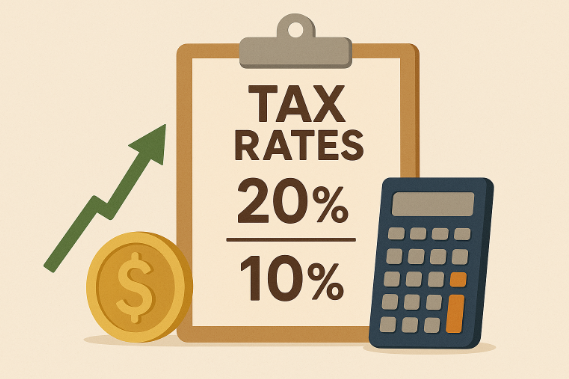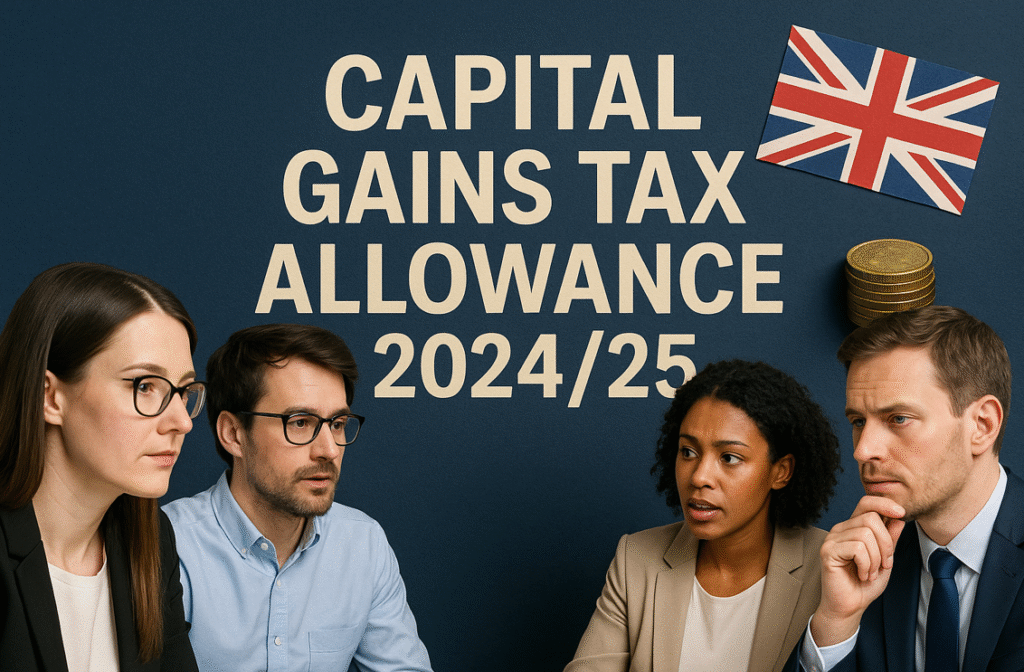The Capital Gains Tax Allowance 2024/25 has been cut again, and it’s a big change for anyone selling property, shares, or valuable assets in the UK. From April 2024, the annual allowance is reduced to just £3,000 per person (£1,500 for trusts), meaning more people will now face a Capital Gains Tax bill.
This matters whether you’re an investor, landlord, or simply selling something at a profit. Understanding the new rules can save you money and stress when it comes to HMRC.
In this guide, we’ll explain how the allowance works, who it affects, what the current CGT rates are, and the smart ways you can reduce your liability in 2024/25.
What is the Capital Gains Tax Allowance 2024/25 in the UK?
The CGT Allowance 2024/25 is the amount of profit you can make from selling assets, like shares, property, or valuable possessions, before paying Capital Gains Tax (CGT). In the UK, HMRC sets this allowance annually, and for the 2024/25 tax year, the allowance has been cut to £3,000 per person.
This means:
-
If your gains are below £3,000, you won’t pay CGT.
- You will be required to pay tax on the excess amount if your gains exceed £3,000.
👉 In previous years, the allowance was much higher. The reduction makes tax planning even more important.
How has the Capital Gains Tax Allowance changed over recent years?
The government has been steadily reducing the allowance, significantly affecting investors, landlords, and even small business owners.
Here’s a quick look at how the CGT allowance has changed:
| Tax Year | Capital Gains Tax Allowance (Individuals) | Capital Gains Tax Allowance (Trusts) |
|---|---|---|
| 2022/23 | £12,300 | £6,150 |
| 2023/24 | £6,000 | £3,000 |
| 2024/25 | £3,000 | £1,500 |
“The steady reduction of the CGT allowance is a wake-up call for UK investors. Tax efficiency is now more crucial than ever,” says Sarah Coles, head of personal finance at Hargreaves Lansdown.
Who needs to pay Capital Gains Tax in 2024/25?
Not everyone pays CGT, but many everyday scenarios are affected. You may owe CGT if you:
-
Sell a second home or buy-to-let property.
-
Dispose of shares outside an ISA or pension.
-
Sell valuable assets like antiques, jewellery, or artwork.
-
Give assets to a different person (not your spouse or civil partner).
👉 Your main home is usually exempt, as long as you’ve lived in it throughout your ownership.
What are the Capital Gains Tax rates for 2024/25?

The rates you pay depend on your income tax band and the type of asset you’re selling.
CGT rates in 2024/25:
-
Basic rate taxpayers: 10% of profits (18 percent for residential property).
-
Higher and additional rate taxpayers: 20% of profits (24% for residential real estate).
How do I calculate capital gains in 2024/25?
Calculating your capital gain is simple:
-
Start with the sale price of your asset.
-
Deduct allowable costs, such as:
-
Purchase price
-
Stamp duty (for property)
-
Legal fees
-
Improvement costs
-
-
The result is your gain.
-
Deduct £3,000 (or £6,000 if a spouse’s allowance is being used).
- Apply the correct CGT rate (10%, 18%, 20%, or 24%).
👉 Example:
- Shares that you purchased for £5,000 were sold for £15,000.
-
Gain = £10,000.
-
Subtract allowance (£3,000) = £7,000 taxable.
- The CGT bill for a higher-rate taxpayer at 20% is £1,400.
How can you reduce your Capital Gains Tax bill in 2024/25?
Even though the allowance has been cut, there are smart ways to legally reduce CGT:
-
Use ISAs and pensions: Pensions and ISA gains are tax-free.
-
Split assets with your spouse: Each partner gets a £3,000 allowance.
-
Offset losses: Keep track of any investment losses and deduct them from any winnings.
-
Time your disposals: Spread sales over multiple tax years.
-
Use annual exemptions fully: Don’t waste the allowance if you can plan asset sales.
👉 As long as you declare any unused capital losses, HMRC permits you to carry them forward to subsequent years.
What is the 7-year rule for Capital Gains Tax?
Not CGT, but Inheritance Tax (IHT) is subject to the 7-year rule. The two are frequently confused. An asset may not be liable to IHT if you give it and you survive for seven years after giving it. However, for Capital Gains Tax, gifting still counts as a disposal at market value, unless it’s to your spouse or civil partner.
👉 In short: The 7-year rule does not exempt you from CGT, but it may reduce IHT on gifts.
Is there a loophole around Capital Gains Tax in the UK?
While there are no true loopholes, smart tax planning helps minimise CGT:
-
Use ISAs and pensions (tax-free shelters).
-
Transfer assets to your spouse.
-
Offset capital losses.
-
Time disposals across different tax years.
⚠️ Important: HMRC closely monitors artificial avoidance schemes. Stick to legal tax reliefs instead of “loopholes.”
How does the Capital Gains Tax Allowance 2024/25 affect property owners?

Property capital gain tax 2024/25 explained
If you sell a second home or buy-to-let, CGT applies. Rates differ from other assets:
-
Basic rate taxpayers: 18% on gains.
-
Higher/additional rate taxpayers: 24% on gains.
Example:
-
Property gain = £50,000.
-
Allowance = £3,000 → taxable = £47,000.
-
At 24% = £11,280 tax bill.
Real estate capital gain tax 2024/25: Can moving back in reduce it?
If you move back into a property before selling, you may reduce CGT using Private Residence Relief. However:
-
You must genuinely live there (not just “pretend”).
-
HMRC checks how long you occupied it.
-
If it wasn’t your primary residence for the whole time, there is only partial relief.
👉 Example: If you lived in a property for 5 years, rented it out for 5 years, then moved back in for 1 year, only 6/11ths of the gain may be exempt.
What records should you keep for HMRC in 2024/25?
HMRC requires clear records to calculate CGT correctly. Keep:
-
Dates and costs of buying assets.
-
Costs of improvements (for property).
-
Selling costs (estate agents, legal fees).
-
Evidence of losses to offset gains.
👉 Good record-keeping helps reduce your tax liability and avoids HMRC penalties.
Is the reduced Capital Gains Tax Allowance fair?

This change has sparked debate:
-
Supporters argue it raises revenue fairly from those with significant investments.
-
Critics say it punishes savers, investors, and landlords at a time of rising costs.
“Reducing the CGT allowance disproportionately impacts middle-income investors rather than the ultra-wealthy,” says Nimesh Shah, CEO at Blick Rothenberg.
Conclusion: What does the Capital Gains Tax Allowance 2024/25 mean for you?
The Capital Gains Tax Allowance 2024/25 has been slashed to just £3,000, making more UK taxpayers liable for CGT. Whether you’re selling shares, a second home, or valuable assets, planning ahead is now essential.
-
Act early to use your allowances.
-
Consider ISAs, pensions, and spouse exemptions.
-
Report accurately to HMRC to avoid fines.
👉 The bottom line: The shrinking allowance makes smart tax planning non-negotiable in 2024/25.
FAQs
What is the Capital Gains Tax Allowance for 2024/25?
The allowance is £3,000 per person (£1,500 for trusts).
How long do you need to live in a property for it to be your primary residence?
There’s no set minimum, but HMRC looks for genuine residence with proof like bills, voter registration, and time spent living there.
Can I move back into a property to avoid Capital Gains Tax?
You can reduce CGT with Private Residence Relief, but moving back doesn’t erase the tax if it wasn’t your main home for most of your ownership.
How to escape from Capital Gains Tax?
You can’t completely avoid it, but you can legally reduce it by using ISAs, pensions, spouse exemptions, and loss offsets.
What can go against Capital Gains Tax?
Allowable costs such as purchase price, improvement expenses, legal fees, and stamp duty reduce the taxable gain.

I’m Adam Milne, a business writer and co-author at UKBusinessMag.co.uk. I’m passionate about simplifying complex topics—whether it’s tax, startup strategy, or digital marketing—so that entrepreneurs can take action with confidence. With years of experience in small business consultancy, I bring a practical perspective to every piece I write, helping readers turn ideas into results.



